Social Media Marketing Strategies for Holiday Lets

Even though a potential booker may initially discover your property on a holiday let listing site like Vrbo or Airbnb, they are still very likely to carry out further research on your property and what they can do in the area before finally deciding whether to book a stay with you.
And what’s the most convenient way for them to check? Your holiday let social media profiles. Your social media accounts are an ideal way for would-be guests to establish that you’re a credible holiday letting business and see whether your social content resonates with them enough to convince them that your property is the one to book.
Is social media a waste of time?
The simple answer is “no”. Social media and being in the habit of marketing yourself online has never been more important. Here’s why:
- This year, an estimated 17 billion people worldwide will be using social media, so it’s crucial for all organisations, not least holiday let businesses, to use social media for regular marketing and brand-building.
- Social media marketing allows you to create brand awareness and build a good reputation online, whilst also allowing you to network with local businesses and holidaymakers.
- Social platforms like Facebook are a brilliant way to connect with your previous guests, upcoming guests, and potential guests all at once; not to mention that social is the most globally used digital marketing channel these days. Social media platforms are also free for businesses to use (if you’re not using any paid advertising services).
There will be a large proportion of holiday cottage owners who think posting regularly is the most important part of being on social. This approach, however, is more ‘throwing content against the wall to see what sticks’.
In these cases, owners may not be taking full advantage of all the features a specific social platform has to offer. They are not thinking strategically about all the tactics they can utilise to build a genuine following and engagement — not to mention the chance to drive more traffic to their website/listing.
With social media becoming a significant part of the marketing mix, owners must embrace it because when harnessed correctly, holiday rental owners can use it to:
- Provide customer service
- Generate new bookings
- Advertise their business
- Build brand awareness
- Earn credibility through guest reviews and endorsements
- Drive more traffic to their website
Think about your own situation for a moment:
- Is the time you currently spend marketing your holiday let on Facebook, Instagram and/or X (Twitter) making a positive impact on bookings?
- Do you think there is more you could (and should) be doing?
- Is more focus needed on aspects such as keeping the basic information on each of your social profiles up-to-date and relevant?
Below, we’ve compiled some information and ideas to help you improve the quality of your organic social media marketing. We focus on three platforms in particular – Facebook, X, and Instagram, and we’ve also included some examples of real-life holiday let business accounts to help inspire your marketing activities.
How to market your holiday let on social media

Define your social media strategy
It’s never too late to take a step back and analyse how you’re using social media — even if you’ve already been using it to market your holiday let for years.
The first step is to define your audience. For example, what does your ideal guest look like? Writing down your target audience demographics (e.g. age range, holiday duration, holiday objective, etc.) will help you define more accurate buyer personas.
Next, think about the type of content you’re planning to share (more on this next). You’ll also need to decide on the best times to post on each platform. For this, you may want to research when your audience is most likely to be active on each platform.
The purpose of all this groundwork is to formulate a strategy when creating content to promote on your social media channels. In short: send the right message at the right time to have the most chance of gaining traction and engagement with your target audience.
Remember, social media is always changing, so your social media strategy should, too. As your audience and engagement volumes increase, create new social media goals and continue to grow your online presence.
Lastly, don’t forget to research what your closest competitors are publishing on social media. Look at how often they post, what content is popular and the formats they’re using (videos, photos, graphics). Comparing yourself to the competition can help you identify potential gaps in your strategy.
Invest time in creating social media content
It’s important to think through exactly what you’re going to post and why. You need to make sure that the content you create is relevant, eye-catching, and creative.
The aim is to keep your audience as engaged as possible so that they remember you when they’re next planning a holiday. Whether that’s previous guests you’re hoping to turn into advocates for your business, or new audience members that you want to convert into bookers.
A typical user spends 2.5 hours on social media platforms every day. Their behaviour is of a fast-paced nature. For example, much of social media usage involves scrolling through newsfeeds and timelines. It means that your social posts need to be top-notch to attract someone’s attention.
To that end, think about using short sentences and captions, high-quality images, and hashtags that are relevant to your intended audience. Here are just a few ideas of themes you could use for your posts:
- Details on specific rooms or outdoor spaces at your property
- Festive and seasonal messages
- Accessibility information
- Local highlights and events
- The host’s favourite beauty spot and local eatery
- Facilities and home comforts for pets
- Information about any extra services you offer
Here are some other tactics to create different types of content for your social media channels.
Show your potential guests what they’re missing
It’s only natural that lots of your content will focus on promoting your holiday let, inside and out. High-quality photographs are a great way to inspire and attract potential guests and get bookers even more excited about their upcoming stay with you.
Share late deals and special offers
Deals and special offers can keep followers interested. However, you mustn’t overload your followers with too many sales pitches. If your social feed reads like one long advertisement, it can easily be perceived as ‘spam’ to your audience; causing people to click away from your page.
Offering ‘spontaneous’ deals with what appears to be a lucrative incentive can prove far more effective. Not only does this content instantly become more shareable between others on social, but it intrigues current followers and entices new ones too.
Therefore, it’s worth considering creating a deal for out-of-season stays. For example, many people enjoy the prospect of a short break when occasions like Christmas, Easter and Valentine’s Day are on the horizon.
So, you might want to publish posts about special offers to entice early bookings or fill any gaps caused by cancellations. These types of deals not only add variety to your social content but also give those genuinely looking for a good deal a reason to become a follower of your social channels.
Build relationships with local businesses
Not only is it important to build relationships with holidaymakers, but it’s also important to engage with local businesses that complement what your holiday let offers.
Anyone who goes on a holiday will visit some of the local shops, cafés, restaurants and attractions. This means that setting up mutually beneficial collaborations with local businesses can create yet another incentive for potential guests to book.
Discounts for the places where guests will inevitably be spending money can be a great selling point; especially for families looking for an affordable, value-for-money getaway.
You could also consider welcoming your incoming guests with a basket filled with locally-produced goods. This can make for an enticing social media post that also promotes those local businesses.
In turn, these local ‘partners’ will likely share and comment on your posts; meaning more reach for your content and more marketing exposure to even more people.
Connect and receive feedback from guests
A happy guest can be a brilliant future advocate of your business on social media. Don’t forget to include your social media profiles on your guest communications, and in your email signature. You could even make a cute blackboard and chalk sign for your holiday property which displays them.
Once a guest has stayed at your property, encourage them to leave a review, share their holiday images (tagging your holiday let, of course), and write about their holiday experience on your page.
You can gently prompt your guests to do this by sending them an email the same day as they leave, or the day after — while their holiday experience is still fresh in their minds.
You could run a simple competition for the ‘best guest holiday photo’ that showcases your holiday let’s general location. This encourages people to create user-generated content that you can use to help raise awareness about your property and the locality that surrounds it.
Consider interacting with your audience proactively by asking simple questions, for example, “What essential items would you like to see in your holiday home welcome basket”?
Not only will this kind of audience input provide you with new ideas, but you’ll also demonstrate to customers old and new that you care about their opinions and truly value what they have to say.
Use the tactics above to help you build that all-important two-way conversation with your guests and the wider audience. And, when people leave comments on your posts, always acknowledge and engage with them.
If they’re asking for some quick advice, respond promptly to try and help them out. This personal touch shows a friendliness that people will appreciate — and are likely to remember.
Share your local tips and knowledge
The beauty of social media is that it enables you to share your own experiences, knowledge, and insights about the local area with others — what there is to do and see, for example.
What content might entice potential guests to book with you? It could be a post (linking to your blog) about a nearby attraction, you might live in an area surrounded by amazing pubs or farmers markets, or perhaps you could highlight the wonderful country walks and scenery on your doorstep.
There might also be some hidden gems that could be shared with potential guests, such as a secluded beach or a restaurant that the locals don’t want tourists to know about.
Ask your audience
Run ‘quick polls’ with your social media followers on Facebook and X. For example, ask them what feature is most important when booking a holiday home? – pet-friendly, private parking, a pub in walking distance, hot tub etc. This type of content can boost general engagement levels with your brand too.
Using paid social ads as part of your social media strategy
Platforms like Facebook and Instagram allow you to target your advertising at specific audiences using an array of possible targeting options, such as:
● Age group
● Gender
● Geographical location
● Interests/hobbies
Furthermore, you can create adverts in a range of formats including video, carousels, and single images. Depending on how effectively you’ve set up your social advertising campaign, your advert may end up on the timelines of hundreds, if not thousands of people.
If you’re new to the concept of social media advertising, there are plenty of free guides out there to help you get started; not least from the social media platforms themselves. We’ve provided quick links to the main platforms of interest to holiday let owners below:
Which social media platforms you should focus on?
Here are the three main social media platforms you should focus most of your social media marketing efforts on.
Facebook marketing tips for holiday rentals
Facebook is the most popular social media platform globally, with around 3.03 billion users. It’s therefore a huge market to tap into to promote your holiday home. As long as you keep posting useful and engaging content, it can be a great platform for attracting future bookers and engaging with existing guests.
As well as posting content about your property, Facebook can be a great place to deal with incoming enquiries due to its ‘Messenger’ feature. Rather than a potential booker needing to go to your website to send an enquiry, it can be a far easier and quicker way for them to send you an enquiry or message.
For Business Pages, there are several other useful features included, such as a native ‘reviews’ feature, which when switched on, allows guests to rate your property and leave a review directly on your Business Page. This acts as ‘social proof’ to others who may be researching their next holiday.
You can also set up special offer posts and events, create gallery collections of photos, and create a list of services.
You will also find a large number of holiday home-related groups on Facebook, with most of them directly targeting travellers and holidaymakers. This is yet another potential option for sharing your social content; you just need to cherry-pick the right groups, abide by the group owners’ rules, and keep any content and messaging as relevant as possible.
Creating content for Facebook
As is true for all the social platforms you’ll be leveraging to promote your holiday rental, you should aim to include a mixture of different types of content for your social posts.
Think about including the following:
- Picturesque images of the local area (beaches, countryside views, attractions, historical landmarks, local events, tasty-looking dishes from local eateries)
- Short and snappy videos that showcase the very best of your town. You can create one on your mobile phone using this simple guide
- Information about what to do in the local area – for example, the best pub that’s within a short walk of the property, when the next farmer’s market is happening, local attractions, best days out…
- Any helpful travel or weather-related updates
- News, competitions, and promotions
- Snippets of past guest reviews showing off positive feedback from guests
Notice that none of the above focus on your actual property. It is wise to mix up different topics to continually offer your audience an all-round view of what they can expect if they stay with you.
As we touched on earlier, if you have the budget, you could consider trying some Facebook advertising. It can create extra brand awareness and may even prove effective in providing a boost to your bookings; especially during low-season periods.
Facebook Ads allows you to target potential customers by their demographics and interests, so you could, for example, set an ad up to promote your Lake District dog-friendly cottage aimed specifically at people aged 40+, who are located in the UK and interested in walking with their dog.
If you’re interested in the advertising side of Facebook, you can learn more here; how to get started with an ad account.
Who is using Facebook well?
Lots of hosts have excelled at social media and developed an extensive online presence. The majority of which has been achieved with images and informative captions. These days, Facebook allows you to mix up your content formats and even content from your Instagram channel (for example, ‘Reels’) to keep things interesting.
Southwell Holiday Cottage is a brilliant example of this. Its Facebook page has been building up a strong profile with the help of videos, high-quality images, and the promotion of local events and attractions.
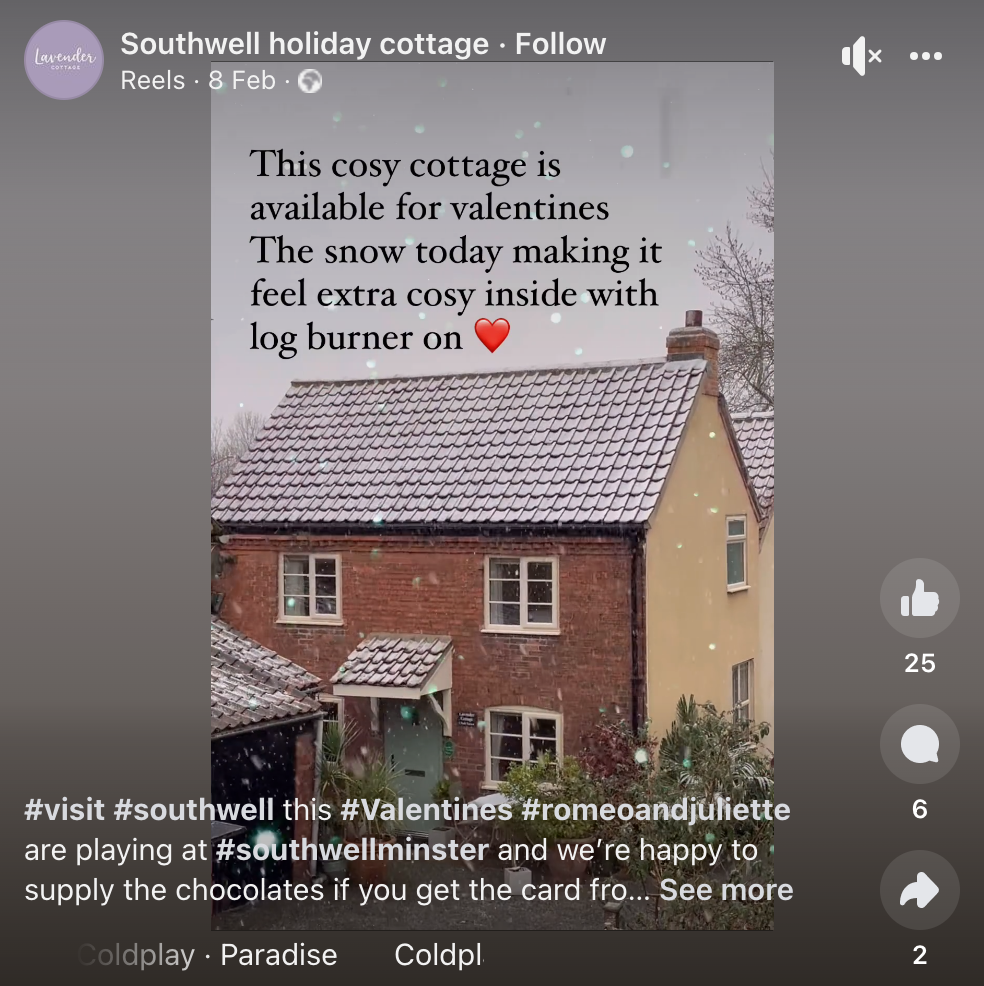
The posts they publish are primarily based on using high-quality images and engaging captions which provide helpful nuggets of relevant information. This allows them to effectively show off their property – all without pitching a sale. Instead, these posts simply serve to create awareness amongst followers.
Another successful Facebook page is Sally’s Cottages, which has over 598,000 followers. The Cumbria-based holiday cottage agency attracts high volumes of users with their array of content and enticing competitions.
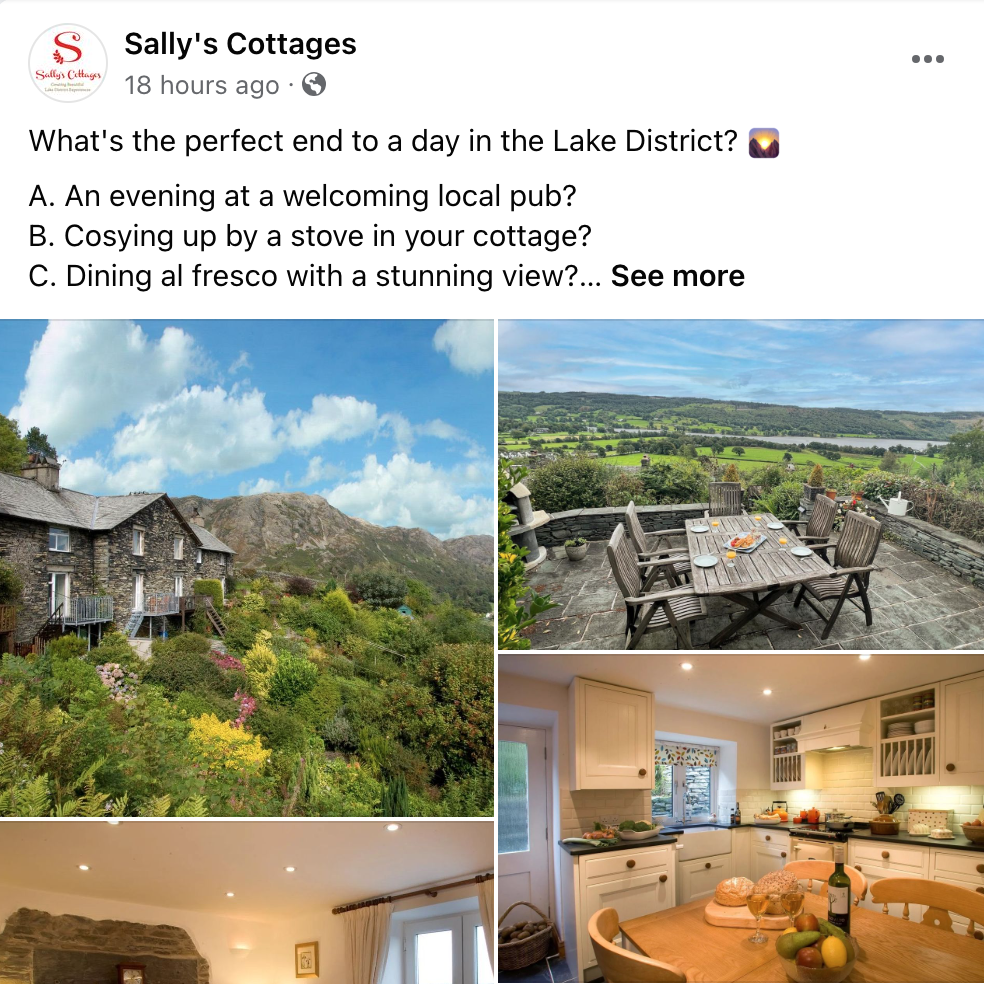
The simple yet striking post above received 56 likes and 81 comments. The positive response has been prompted partly by the open-ended question featured in the social post; Sally’s Cottages is asking their audience a question and values their opinion.
Like Southwell Holiday Cottage, Sally’s Cottages primarily focuses on images. In particular, collages and slideshows that showcase various rooms within a property.
Often these posts are accompanied by a longer description that includes all the essential information on that property – e.g. the number of bedrooms, living room size, features, WiFi etc.
If you’re looking for some further reading on getting started with a Facebook Business Page, or even seeing what you might be able to do to improve your page’s engagement, visit this helpful site.
X (previously Twitter) marketing tips
X is a fast-moving, ‘conversational’ social platform, and like Facebook, it allows you to quickly engage with holidaymakers and other businesses.
You can easily engage with multiple profiles for information, ideas and networking. A simple search for keywords like ‘holiday cottage’ or ‘staycation’ means you’ll soon be discovering relevant profiles that may be interested in what your holiday letting business has to offer.
Like other social channels you’re using to promote your holiday let, X, when harnessed correctly, can help you become a trusted information source through the posting of useful, informative content, quality images and videos. However, you’ve got to be savvy in promoting your holiday property. As with the other social platforms you’re marketing on, you don’t want your messages to come across as sales pitches.
There’s a slight challenge too, with the limited character count available for posts, (280 characters).
Using hashtags is a brilliant way to maximise the number of potential people seeing your posts on X. However, only use hashtags that fully relate to your post otherwise it’s a waste of those precious characters. Focus on a few hashtags such as #TravelTips, #AirBnBHome, #HolidayCottage, #LakeDistrict, etc. which are popular and relevant to the content you’re posting about.
But how do you know what kinds of hashtags you should be using? Tools like hashtag tracker can help guide you towards the right choices (though they may carry a cost). For example, they will use the latest data to show you information on the most popular hashtags.
Through the posting of:
- high quality, interesting or informative content
- at the right time
- on a consistent, regular basis
- including the most appropriate, relevant hashtags
…you’ll have the best chance of attracting and engaging your target audience and building up more of a following on X and for your holiday rental business.
Who is using X well?
Once again, there are many hosts and letting agencies that have successfully utilised X and its audience. For example, Durrants Holiday Cottages ensure they stay active by posting a wide range of content, from PR features to cottage offers, local attractions, and general news on cottage availability.
With their striking images, offers and use of hashtags, Durrants has built a strong presence for themselves on X.
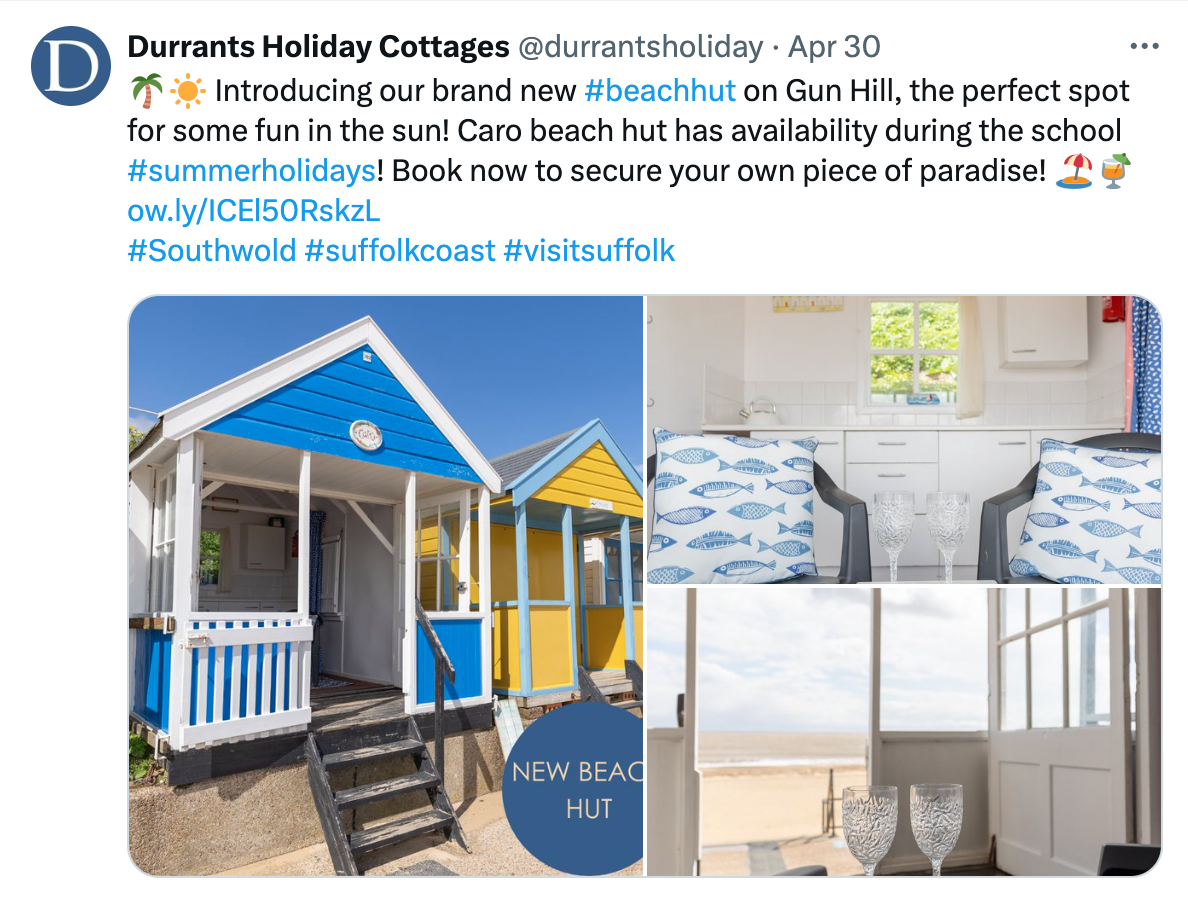
If you’re looking for some further reading on setting up and running an X account for your holiday let, we recommend you take a look at this helpful guide for more guidance and tips.
Tips to improve your Instagram marketing strategy
“A picture paints a thousand words.”
It’s a well-known fact that images can resonate more than the written word, and it just so happens that most people love sharing photos of their holiday. It’s why Instagram is an essential social platform that all holiday let owners should be tapping into, and why the term ‘Instagrammable’ exists.
As a platform entirely led by imagery, Instagram allows you to showcase all those hard-to-resist, dreamy images of your property and its idyllic surroundings. After all, it’s a no-brainer that potential bookers will want to see what your holiday rental and the surrounding area are like before they commit to making a booking.
Just like X, Instagram posts can be seen by more people through the use of hashtags. Given that travel is such a huge market, there will be hundreds of popular hashtags that may be useful to include in your own Instagram content.
Instagram written captions accompanying each image (or set of images) can be up to 2,200 characters long and can contain up to 30 hashtags.
But whilst the number of hashtags available is fairly large, using too many on a post will be overbearing and distracting to your audience, so try to include between three and five of the most relevant ones.
Who is using Instagram well?
Margate Suites is one social profile to emulate, due to the high-quality content they publish, the beauty of their images, and the very well-organised attractive profile they’ve built.
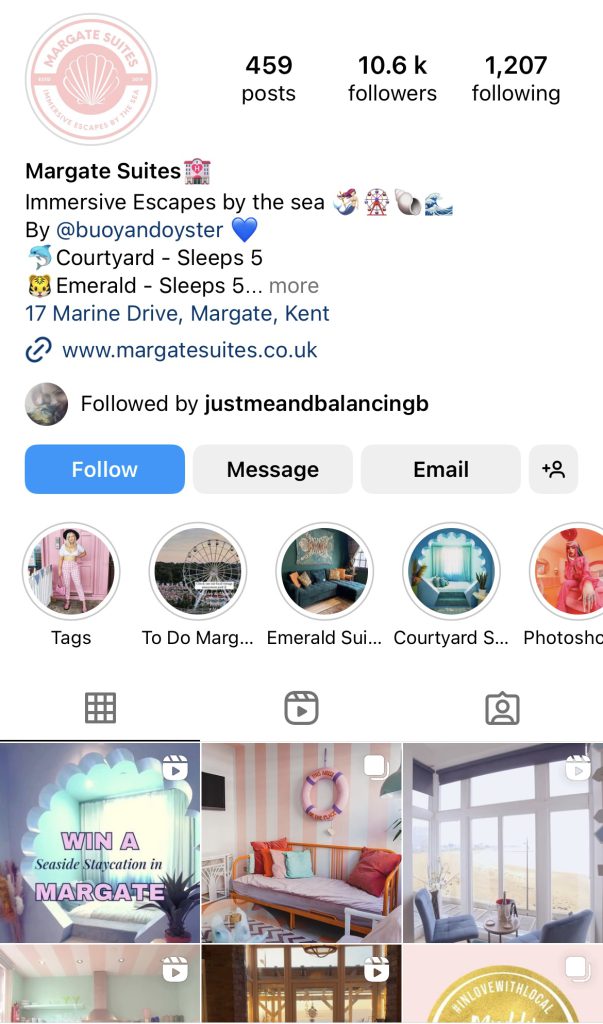
Their Instagram profile has gained nearly 11,000 followers since it was first set up, attracting high volumes of likes and comments each time a post is published. You can see from the profile below that every single opportunity has been used to provide information and add branding.
Check out Little Mill Abergavenny for some inspiration too. These historical, Welsh holiday cottages based in Abergavenny have previously been featured by publications like House and Garden and The Times — proving that the owners know how to take a good photograph.
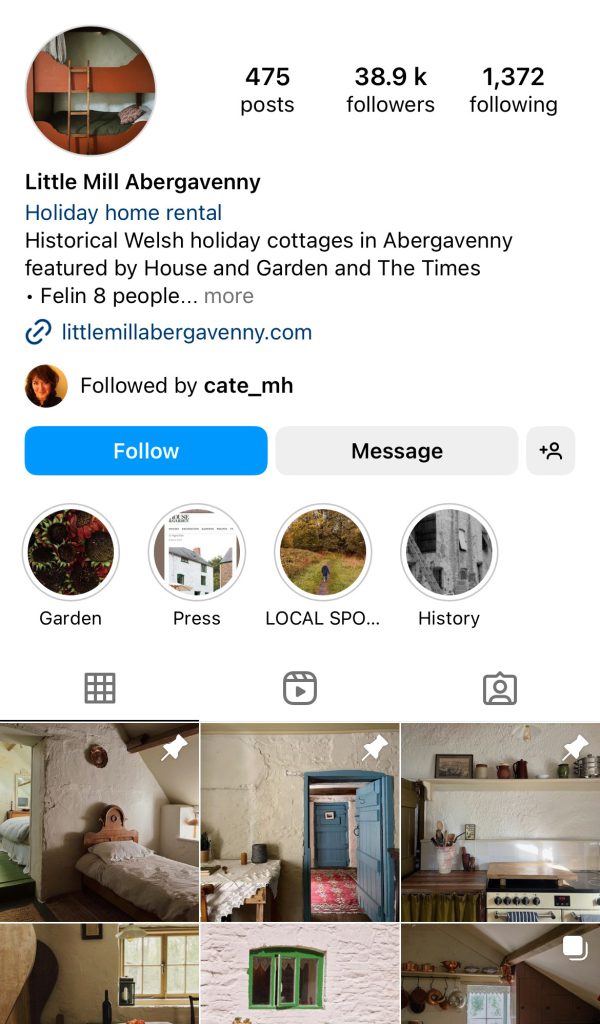
Their interior and exterior shots regularly attract hundreds, sometimes thousands of likes.
For some further reading on setting up and running an Instagram account, check out this informative article for some comprehensive tips and tricks.
Other social media platforms you should consider
TikTok
TikTok has become a worldwide sensation over the past few years and is used mainly by the younger generation. As it’s heavily trend-based, TikTok might be worth experimenting with when it comes to your holiday let content — you may find new, or more niche audience members to market your property to.
Just make sure that you thoroughly research which hashtags and topics are trending that day (or week) to be in with a chance at gaining some traction.
If part of your social content offering is about interior design, the Pinterest platform may be worth factoring into your social media marketing efforts. Pinterest is largely about ‘discovery’ and based heavily on search, so it may be worth trying some relevant content to see whether you attract any engagement.
Keep your expectations realistic, however; Pinterest may only become a small contributor to your overall social marketing when it comes to attracting website traffic and bookings.
Automate your social media marketing
No matter how many properties you have to promote or how many enquiries you receive each week, some of the social media marketing can be done in advance each week (or month) by setting up batches of social posts for each platform.
To do this, you’re best to use a social media management tool. Here are a few suggestions, which you can take a look at and research further:
- Hootsuite (30-day free trial available)
- Loomly (15-day free trial available)
- Sprout Social (30-day free trial available)
By using these tools, you’re able to better control and maintain all of your social marketing content in one place.
Not only can this be useful for reminding yourself about what’s been recently posted, but by setting aside a bit of time each week to do this work upfront, you’ll find that it allows you more time to concentrate on those really important social interactions – such as incoming comments and direct message enquiries.
Some social media housekeeping tips
Ensure that your social media pages are fully optimised
Each social media platform is in constant development and with that comes ever-changing new features and functionality for your pages. This means that it’s critical to keep your business profiles up to date and look out for product changes week-to-week. Beyond this, some elements of your social pages that should be set up as a minimum, such as contact information, location, and buttons and links to send messages or visit your site.
A fully completed profile can also strongly indicate to visitors that your holiday let is very much ‘open for business’ too.
Periodically check for social accounts imitating your business
Finally, be sure to check your social media platforms for fake accounts set up in your business’ name every so often.
It’s not something we like to think will happen, but reality shows us otherwise. Eliminating false accounts by reporting them to the social media platform in question helps guarantee that your potential guests are finding and interacting with your brand’s genuine accounts – and that’s better for your social media strategy, your brand reputation, and your business overall.
Keep on top of any messages and comments
This one doesn’t need much explanation, but it’s a good idea to stay up to date with any notifications you receive about incoming social comments or messages so that you can acknowledge or respond to them as soon as possible.
These little touches can help to build a good impression of your holiday let business, and shows respect for your audience.
Don’t forget to monitor performance
Once you are firmly in the habit of creating content and posting on your social channels, you’re well on your way to actively strengthening your holiday lets online presence — but don’t forget to evaluate how your social channels are performing.
Looking at how all your different social channels are performing in terms of engagement (likes, shares, comments) and traffic referrals to your holiday let website (view these stats in Google Analytics) can help you identify what’s working and what’s not.
You can either look at the performance analytics in your individual social media accounts or invest in a special social analytics tool to help you centralise everything to make it easier to spot trends and patterns. There is a huge amount of choice (and variance in cost) when it comes to this type of software, so take advantage of free trials so that you can be sure the products are right for you before you invest.
Understanding your channels’ analytics will help you refine your strategy for the future and save you time in terms of knowing what types of social content is engaging audiences — and what’s proving ineffective.
In summary
It’s important to remember that not all of your social media posts are going to generate views, likes, comments and not all of your special offers will generate bookings.
Building up a strong social media presence takes time to achieve, and so you’ll need to keep your marketing efforts up over a sustained period.
However, in the meantime, if you’re executing your social media marketing strategy well, you’ll be interacting and building relationships with potential bookers, recent guests and local businesses. All of these interactions can mean increased confidence in your brand from your audience and extra credibility gained through the conversations you’re having with bookers and potential guests.
Don’t forget that today’s traveller researches everything online before they book – including investigating your holiday let business pages on social media. So, when potential guests visit your page and see all of your 5*reviews and pictures from happy guests, this can provide them with the confidence and reassurance they need to book a stay with you.
Helpful articles and resources for further reading
